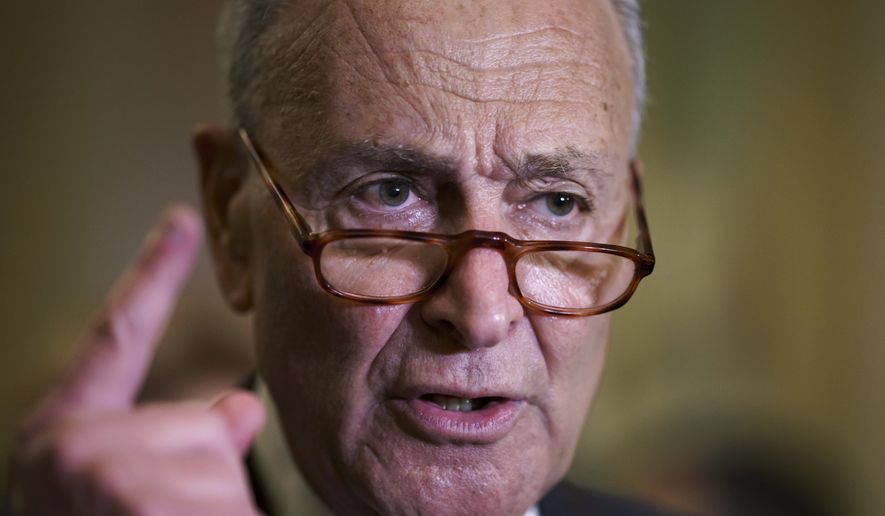Senate Republicans blocked a measure Monday to temporarily fund the government and suspend the debt ceiling, pushing Congress closer to the brink of a shutdown and default showdown.
The Republican filibuster of the House-passed bill, though expected, brought into sharp relief the fast-approaching deadlines to avoid a government shutdown Thursday and a U.S. credit default in roughly three weeks.
Senate Majority Leader Charles E. Schumer, New York Democrat, needed at least 10 Republican votes to overcome the 60-vote filibuster threshold.
Not a single Republican joined the chamber’s 50 Democrats to try to keep the bill alive.
The standoff pits Democrats, who don’t want to underscore their massive spending with a party-line vote to raise the debt limit, against Republicans, who don’t want to give any political cover to the majority.
Congress’ failure to raise or suspend the debt limit would force the Treasury to decide which obligations to pay and which go into arrears. It would also risk severe economic consequences, such as panic selling on Wall Street.
Senate Majority Leader Charles E. Schumer, New York Democrat, called the Republican filibuster “one of the most reckless, most irresponsible votes I’ve witnessed in the U.S. Senate.”
“The Republican Party has solidified itself as the party of default, and it is the American people who will pay the price,” Mr. Schumer said.
Senate Minority Leader Mitch McConnell, Kentucky Republican, said Democrats would have to ram through President Biden’s $3.5 trillion of social welfare and climate change programs on their own.
“There’s no chance Republicans will help lift Democrats’ credit limit so they can immediately steamroll through a socialist binge that will hurt families and help China,” Mr. McConnell said on the Senate floor before the vote. “If they want to tax, borrow and spend historic sums of money without our input, they’ll have to raise the debt limit without our help. This is the reality.”
Democrats have pressed for a bipartisan vote on the debt ceiling and warned that failing to do so would have disastrous consequences.
The Treasury estimated that the government could run up against its borrowing limit by mid-October.
The suspension of the debt limit until December 2022 is included in a stopgap spending bill to avoid a government shutdown at midnight Thursday. The temporary spending measure would keep the government open until Dec. 3.
Republicans have demanded separate votes on government funding and the debt limit. They say Democrats should fully own the debt hike in light of the massive spending they have in store.
Republican strategist Christopher Wilson of WPA Intelligence said the Democrats’ move to tie the debt ceiling to the stopgap government funding measure is a clear sign that they are worried about how voters will view the massive spending bill.
Democrats, who control the White House and both chambers of Congress, can pass the debt ceiling package through a reconciliation measure that would require only a simple majority to pass. That is how they intend to pass Mr. Biden’s massive bill for anti-poverty, education, health care and climate change programs.
“The reason they don’t want to take the easy and obvious path now is that they don’t want to be responsible for the number on the debt ceiling hike,” Mr. Wilson said. “If they do it through reconciliation, they have to put a number on the debt ceiling, and then they own those trillions in borrowing.”
The national debt currently stands at $28.8 trillion.
Democrats still face looming shutdown and default deadlines.
The budget reconciliation process has been used only a few times to raise the debt limit. Adding the measure to the $3.5 trillion in spending would unlock more division among Democrats.
Senate Majority Whip Richard J. Durbin, Illinois Democrat, told reporters that he was not sure whether they would agree to pass the debt ceiling measure through the reconciliation process.
Polling shows that both Democrats and Republicans stand to lose if they don’t stop a shutdown or default.
Although the blame for a government shutdown or a debt default would skew slightly toward Democrats, the majority of respondents in a poll would blame both parties.
When asked who would be to blame for a government shutdown, 32% pointed fingers at Democrats, 24% would blame Republicans and 36% said Republicans and Democrats would be equally responsible.
Regarding blame for a potential default, 31% would blame Democrats, 20% Republicans and 39% said both parties.
• Joseph Clark can be reached at jclark@washingtontimes.com.
• Kerry Picket can be reached at kpicket@washingtontimes.com.




Please read our comment policy before commenting.